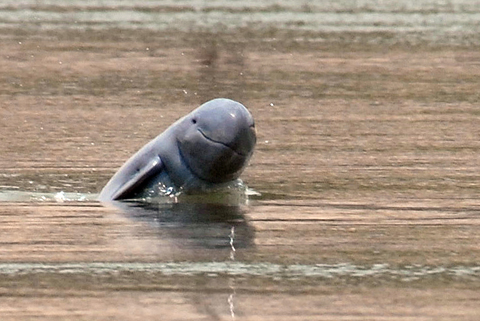Pollution in Southeast Asia’s Mekong River has pushed freshwater dolphins in Cambodia and Laos to the brink of extinction, an international conservation group said yesterday.
The World Wide Fund For Nature (WWF) said only 64 to 76 Irrawaddy dolphins remain in the Mekong after toxic levels of pesticides, mercury and other pollutants were found in more than 50 calves who have died since 2003.
“These pollutants are widely distributed in the environment and so the source of this pollution may involve several countries through which the Mekong River flows,” WWF veterinary surgeon Verne Dove said in a press statement.

PHOTO: AFP
The organization said it was investigating how environmental contaminants got into the Mekong, which flows through Cambodia, Laos, Myanmar, Thailand, Vietnam and the southern Chinese province of Yunnan.
The WWF said it suspected that high levels of mercury found in some dead dolphins came from gold mining activities.
It added that Irrawaddy dolphins in Cambodia and Laos urgently needed a health program to counter the effects of pollution on their immune systems.
Inbreeding among the small population could have also contributed to weakened immune systems of the young dead dolphins, all of whom were under two weeks old.
“The Mekong River dolphins are isolated from other members of their species and they need our help,” WWF Cambodia country director Seng Teak said, adding that the mammals “can show remarkable resilience” if their habitat is protected.
The Mekong River Irrawaddy dolphin, which inhabits a 190km stretch in Cambodia and Laos, has been listed as critically endangered since 2004, the WWF said.
Thousands of Irrawaddy dolphins once swam in the Mekong. Although regarded as sacred in Cambodia and Laos, their numbers were cut by illegal fishing nets and Cambodia’s drawn-out civil conflict, in which dolphin blubber was used to lubricate machine parts and fuel lamps.
The Cambodian government, however, has been promoting dolphin-watching to attract ecotourism and cracked down on the use of illegal nets that entangled them.
It was hoped that banning fishing nets in dolphins’ protected areas would raise their number to 170 within the next few years.
The Mekong is one of only five freshwater habitats in the world for the Irrawaddy dolphin, and Cambodia was thought to support its largest remaining population.
With their pale grey skin and blunt beaks, Irrawaddy dolphins resemble porpoises more than their sea-going cousins, and congregate in a handful of the Mekong’s natural deep-water pools.

Kehinde Sanni spends his days smoothing out dents and repainting scratched bumpers in a modest autobody shop in Lagos. He has never left Nigeria, yet he speaks glowingly of Burkina Faso military leader Ibrahim Traore. “Nigeria needs someone like Ibrahim Traore of Burkina Faso. He is doing well for his country,” Sanni said. His admiration is shaped by a steady stream of viral videos, memes and social media posts — many misleading or outright false — portraying Traore as a fearless reformer who defied Western powers and reclaimed his country’s dignity. The Burkinabe strongman swept into power following a coup in September 2022

‘FRAGMENTING’: British politics have for a long time been dominated by the Labor Party and the Tories, but polls suggest that Reform now poses a significant challenge Hard-right upstarts Reform UK snatched a parliamentary seat from British Prime Minister Keir Starmer’s Labor Party yesterday in local elections that dealt a blow to the UK’s two establishment parties. Reform, led by anti-immigrant firebrand Nigel Farage, won the by-election in Runcorn and Helsby in northwest England by just six votes, as it picked up gains in other localities, including one mayoralty. The group’s strong showing continues momentum it built up at last year’s general election and appears to confirm a trend that the UK is entering an era of multi-party politics. “For the movement, for the party it’s a very, very big

ENTERTAINMENT: Rio officials have a history of organizing massive concerts on Copacabana Beach, with Madonna’s show drawing about 1.6 million fans last year Lady Gaga on Saturday night gave a free concert in front of 2 million fans who poured onto Copacabana Beach in Rio de Janeiro for the biggest show of her career. “Tonight, we’re making history... Thank you for making history with me,” Lady Gaga told a screaming crowd. The Mother Monster, as she is known, started the show at about 10:10pm local time with her 2011 song Bloody Mary. Cries of joy rose from the tightly packed fans who sang and danced shoulder-to-shoulder on the vast stretch of sand. Concert organizers said 2.1 million people attended the show. Lady Gaga

SUPPORT: The Australian prime minister promised to back Kyiv against Russia’s invasion, saying: ‘That’s my government’s position. It was yesterday. It still is’ Left-leaning Australian Prime Minister Anthony Albanese yesterday basked in his landslide election win, promising a “disciplined, orderly” government to confront cost-of-living pain and tariff turmoil. People clapped as the 62-year-old and his fiancee, Jodie Haydon, who visited his old inner Sydney haunt, Cafe Italia, surrounded by a crowd of jostling photographers and journalists. Albanese’s Labor Party is on course to win at least 83 seats in the 150-member parliament, partial results showed. Opposition leader Peter Dutton’s conservative Liberal-National coalition had just 38 seats, and other parties 12. Another 17 seats were still in doubt. “We will be a disciplined, orderly